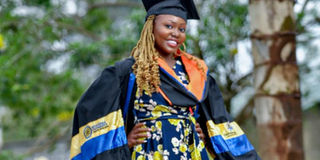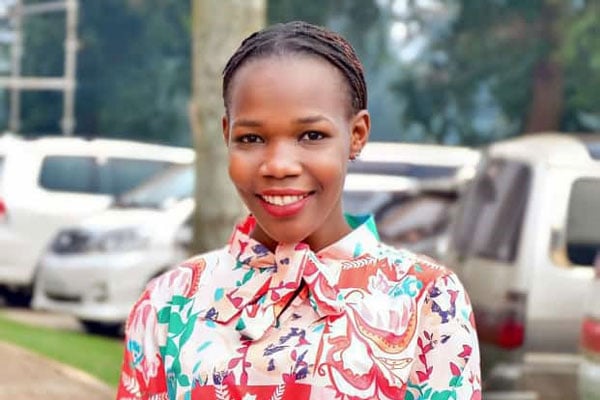Sickle cells didn’t stop Abbo’s education dream

Teddy Abbo on her graduation recently. PHOTO | COURTESY
What you need to know:
- Teddy Abbo, 23, graduated recently with a Bachelor of Information Technology from Busitema University in Tororo campus. Abbo was diagnosed with sickle cell disease when she was eight months old but her health condition did not deter her education dream.
Teddy Abbo, a resident of Tororo District, is one of the thousands of Ugandans living with sickle cells.
Abbo’s story of success through pain tells us how strong and determined she has been through her education to attain her bachelor’s degree.
She graduated with a Bachelor of Information Technology at Busitema University, Tororo branch last week on Friday.
“My parents could afford another or even better university but because I am very sickly, they always wanted me to be in a school near home to easily access care,” Abbo says.
Her dream of Law
Growing up, Abbo wanted to be a lawyer but she says because of her ill health, her dream did not materialise because the universities in Uganda that offer the course were far away from her home. This distance could have given her hard time in case she fell sick.
“I dreamt of pursuing Law at Makerere University, but the school is far from home and it would have been complicated for me to access medical attention since I fall sick several times a month,” she says.
However, she adds that she is still grateful that she has been able to pursue a good course and complete it with good grades, and says she is ready to go for a Masters in the same course and at the same university because of the distance.
It is now 23 years since Abbo was diagnosed with sickle cell disease and she says doctors got to know it when she was eight months old. However, when she started school, “I spent a few days in school, fell sick for a few weeks or even months, but returned to school, did exams and came top of my class.”
Abbo attributes her success to loving parents who understand her situation and advise her to study in schools near home.
“I always wanted to attend ‘big schools’ so that I could also explore life there but I knew that I would not cope. My parents talked to me about studying in schools near home and made me understand that being in any available school near home was okay if I just focused on my academics,” she recollects.
She adds, “I took their advice and here I am, done with my degree. It was not easy though because I would attend university lectures like 10 times a semester. I did not get any retake and I am grateful to my classmates, friends and lecturers who were really there for me.”
“I constantly communicated with my lecturers and friends to make them understand my condition. I was so sickly that I missed out so much but my friends made sure they sent me notes and assignments.”
The bumpy ride
Abbo says, there are schools that do not allow students that have chronic illnesses or fall sick many times in a term.
“In O-Level, I was expelled from a certain school (name withheld), because I was sickly. Even if I was not attending classes and I used to still perform well because God’s grace kept me, they still eliminated me because I was sickly,” Abbo says.
“Their rules were that if you fall sick a certain number of times, you are expelled. So, that is one of the hardest times I faced in school as a person living with sickle cell disease,” she adds.
Abbo says even with the sickness she never gave up because she believed that if she was alive and had brains ,she would accomplish her education dream.
“Even when I could not walk because of pain, even if it meant being carried to the examination room so that I am not left out, I would always show up to do exams at school,” she says.
She recalls that during her Senior Six final examinations, she was so sick and could not walk.
“I was in severe pain that I could not even sit, so I had to do exams from the sick bay. I would cry because of pain then write for a few minutes, then the pain hits again; but I just had to do my exams because I wanted to complete school,” Abbo recounts. of the resilience it took her.
Her survival tips
As a sickler, Abbo says, you must drink lots of water which is important because dehydration is bad for anyone, most especially people living with sickle cell disease.
“I religiously take my daily medication and pray to God to do the rest, because if it were not for God’s mercy, maybe I would not still be here,” she says.
The 23-year-old says she understands her body and knows exactly when it is telling her to stop pushing it hard and she does just that.
“For example in class, each time I felt tired, I excused myself from the lecture room and went home. Also, when I was still young, I was not allowed to play too much and get tired because people living with sickle cell disease are fragile and doing things that are tiring, could cause one a crisis,” Abbo says.
She cannot forget when she was in Primary Six in 2010 and requested to sit Primary Living Exams.
“I excelled and joined Senior One in 2011, but, I fell sick at the end of third term and was sick for so long that I could not return to school in 2012. In 2013, I was transferred to another school, did interviews and passed then joined Senior Three but I left after a week,” she recalls adding that she was again unable to continue school in 2013. She went back to Senior Three in 2014 and sat her UCE in 2015,”
Paul Onumu, her father describes his daughter as hard working, strong-willed and a go-getter.
“I am so happy that my daughter has graduated. Given her ill health, I did not think she would make it this far, but here she is. God has surely been on our side. Teddy is a brilliant girl who is always determined and once she wants something, she tries so hard to get it,” Onumu says.
Tips to others
Abbo advises people living with sickle cell disease to always be strong because it is tough, not to stress themselves because it is not healthy and not to give up on their dreams or education just because they are sick.
“I know some sicklers always give up on life because of their ill health and say, let me just wait for the day I will die. Do not do that! Try your best, at least do something you will be proud of, ensure you take your medication, be happy and prayerful,” Abbo says with a smile.
Did you know?
According to the World Health Organisation, sickle cell disease is a genetic condition due to a haemoglobin disorder and inheritance of mutant haemoglobin genes from both parents. The chronic and debilitating medical condition is caused by a defect in red blood cells.
Data from the Ministry of Health shows that at least 20,000 babies are born with sickle cells annually.
Currently, the only known cure of the blood disorder is bone marrow transplant.





